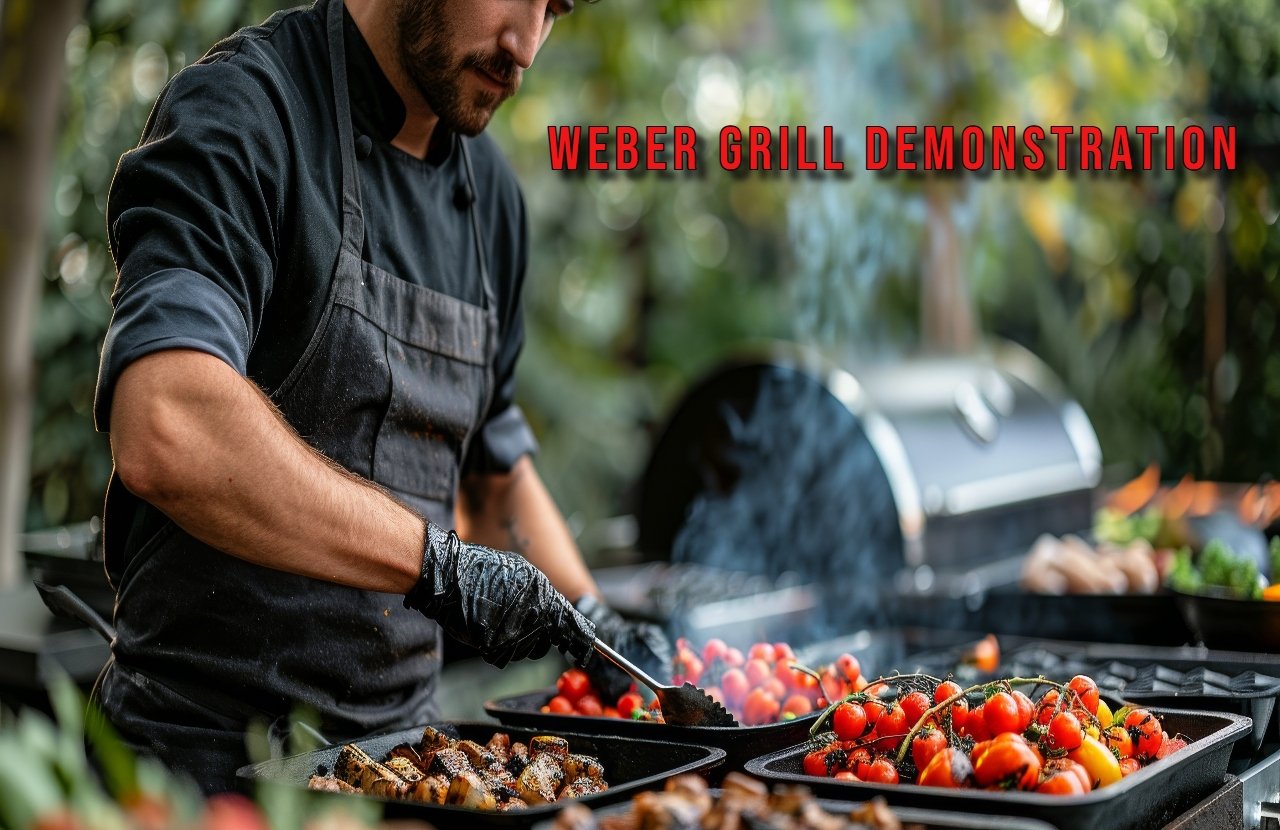Few things bring people together quite like the aroma of food sizzling over open flames. Grilling has always carried a certain magic—it’s part tradition, part innovation, and entirely about flavor. A Weber grill demonstration embodies this magic by blending education, entertainment, and culinary artistry. Whether you’re a beginner exploring your first barbecue or a seasoned griller aiming to refine your skills, these events are designed to inspire.
At a Weber grill demonstration, experts showcase the possibilities of modern grilling, share insider techniques, and let participants taste freshly prepared dishes. Beyond simply learning how to handle equipment, attendees discover how to transform a simple cookout into a full sensory experience.
The Essence of a Weber Grill Demonstration
A Weber grill demonstration is not a sales pitch—it’s an interactive cooking journey. Attendees see firsthand how different grills function, what makes Weber technology unique, and how to achieve professional results at home. Unlike reading a manual or watching a video, these live events allow you to feel the heat, smell the smoke, and taste the results in real time.
The demonstrations typically cover:
- Grill setup and safety basics
- Cooking methods: direct, indirect, and slow smoking
- Recipes for meats, vegetables, and even desserts
- Equipment care and maintenance
- Flavor-enhancing techniques with marinades, rubs, and woods
It’s not unusual to leave with a notebook full of ideas and a full belly from tasting everything on offer.
The History of Weber and Modern Grilling
To understand why these demonstrations carry weight, it’s important to appreciate Weber’s place in grilling history. In 1952, George Stephen, a metalworker from Chicago, revolutionized backyard cooking by inventing the Weber kettle grill. His design, shaped like a buoy with a lid and vents, transformed grilling from a smoky, unpredictable fire into a controlled cooking method.
That invention marked the birth of modern barbecue culture. Since then, Weber has continued innovating with gas, electric, and pellet grills—always prioritizing durability, flavor, and user experience. Attending a Weber grill demonstration is essentially stepping into decades of expertise refined into practical lessons.
Types of Weber Grills You’ll Encounter
Weber showcases multiple models during demonstrations, each designed for different lifestyles and cooking styles:
- Charcoal Grills – Perfect for purists who love smoky flavor. The iconic kettle remains a classic, teaching patience and precision.
- Gas Grills – Ideal for those who want quick heat and simple temperature control without compromising on taste.
- Electric Grills – Great for apartment dwellers or small patios where open flames aren’t allowed.
- Pellet Grills – A newer innovation that combines wood-fired taste with modern convenience and digital control.
Learning the pros and cons of each at a demonstration helps you decide what suits your cooking style.
Grilling Methods Taught at Demonstrations
One of the highlights of any Weber grill demonstration is exploring cooking methods. These are the foundations of grilling success:
- Direct Grilling – Placing food directly over the heat source. Perfect for burgers, sausages, and quick-searing steaks.
- Indirect Grilling – Positioning food away from direct heat, allowing slow and even cooking. Ideal for roasts, poultry, and large cuts of meat.
- Smoking – Using low heat and wood chips to infuse food with rich, smoky flavors over time. Ribs and brisket shine with this method.
- Combination Cooking – A mix of direct and indirect, such as searing a steak quickly over high heat, then finishing it on lower indirect heat.
Hands-on demonstrations make these techniques easy to grasp, even for first-time grillers.
Recipes You Might Experience
Weber grill demonstrations aren’t just technical—they’re delicious. The chefs prepare recipes designed to showcase versatility:
- Classic Steaks and Burgers – With the perfect sear and juicy center.
- Smoked Ribs – Fall-off-the-bone tenderness with layers of smoky sweetness.
- Grilled Vegetables – From charred asparagus to stuffed bell peppers.
- Seafood Specials – Cedar plank salmon or garlic shrimp skewers.
- Unexpected Desserts – Grilled peaches with honey or even chocolate-filled bananas.
These dishes prove that a Weber grill is not just for meat—it’s a tool for full-course meals.
Why Attend a Weber Grill Demonstration?
Attending one of these events comes with multiple benefits:
- Skill Building – You’ll walk away with techniques that instantly improve your grilling game.
- Tasting Inspiration – Sampling dishes may spark ideas for your next barbecue.
- Expert Guidance – Direct access to grilling masters who can answer your questions.
- Testing Equipment – Get a feel for how different grills work before investing.
- Community Connection – Meet fellow food lovers and share tips and stories.
In short, you leave inspired and better prepared to grill with confidence.
Safety and Health Considerations
Weber demonstrations always highlight safe grilling practices. From handling hot surfaces to preventing flare-ups, participants learn how to grill confidently without accidents.
On the health side, Weber emphasizes balance—grilling can be both indulgent and nutritious. Demonstrations often showcase lean cuts of meat, creative veggie options, and marinades that reduce fat while enhancing flavor.
The Social Side of Grilling
Barbecue culture is as much about people as it is about food. A Weber grill demonstration reflects this spirit by fostering community. Friends, families, and neighbors often attend together, turning the learning session into a social gathering.
In many cultures, grilling is the centerpiece of summer celebrations, game days, and holidays. Weber simply elevates this tradition, providing tools and know-how to make each occasion memorable.
Sustainability and the Future of Grilling
Modern grilling is not just about taste—it’s about responsibility. Weber has increasingly focused on sustainable practices, from energy-efficient designs to promoting reusable accessories. Demonstrations sometimes touch on eco-friendly charcoal options, renewable pellet fuels, and minimizing food waste.
Looking ahead, smart grills with digital temperature controls and app connectivity are shaping the future. At demonstrations, you may get a sneak peek into these innovations, bridging tradition with technology.
Tips for Attending a Weber Grill Demonstration
If you’re planning to join one, here’s how to make the most of it:
- Arrive Hungry – Tastings are a big part of the experience.
- Take Notes – Jot down recipes, tips, and techniques.
- Ask Questions – Don’t be shy—experts love sharing knowledge.
- Engage with Others – Swap ideas with fellow attendees.
- Stay Open-Minded – You may discover flavors and methods you never considered.
Frequently Asked Questions
What happens at a Weber grill demonstration?
Experts showcase grills, teach techniques, and prepare dishes for tasting.
Is it only for experienced grillers?
No, demonstrations are designed for all skill levels, from beginners to professionals.
Do I need to bring anything?
Usually no, just your curiosity and appetite.
Can I buy grills at the event?
Yes, many demonstrations include the chance to purchase grills and accessories.
Are vegetarian options included?
Absolutely—Weber chefs often prepare vegetables, cheeses, and even desserts.
Where can I find a Weber grill demonstration near me?
Check Weber’s official website or local retailers for upcoming events.
Conclusion
A Weber grill demonstration is more than a cooking class—it’s a gateway to a richer grilling lifestyle. It blends hands-on learning with mouthwatering tastings, connects people through shared passion, and celebrates the art of fire and flavor.
Whether you dream of mastering smoky ribs, experimenting with grilled desserts, or simply enjoying stress-free barbecues with friends, attending a Weber grill demonstration offers knowledge, inspiration, and lasting memories.
So the next time you see one happening nearby, grab your apron and appetite—it may just change the way you grill forever.

